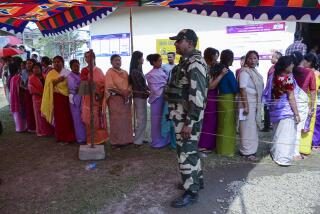Nigerians Go to the Polls in a Landmark Election
- Share via
LAGOS, Nigeria — Resisting fierce rain, threats of violence and apathy, millions of Nigerians turned out to vote Saturday in what many described as a crucial test of civilian rule in Africa’s most populous nation.
Election monitors reported modest turnouts, however, at schools, on street corners and in other polling places where voters cast ballots to elect 109 senators and 360 members of the House of Representatives.
The legislative elections marked the first civilian-run poll in 20 years for Nigeria, which has been governed mainly by military dictators since it gained independence from Britain in 1960.
Heavy rains prevented workers with the Independent National Electoral Commission from delivering ballots on time to polling places in Lagos, the commercial capital, and other parts of the country.
“This is a precious right that we don’t get often,” said Betty Osoba, 48, who waited for 2 1/2 hours in the Ikeja district of Lagos before officials showed up with ballots. “I could wait here all day, because we have to show Africa and the world that Nigeria is starting to take care of its own problems.”
Festus Okoye, head of the independent Transition Monitoring Group, which dispatched 10,000 monitors across the country, reported fewer than expected cases of voting irregularities. In the federal capital, Abuja, he said, the lines at polling places appeared to be longer than elsewhere in the country.
“We are seeing a new awareness from Nigerians who believe that the power of the vote could make a difference,” Okoye said.
Election day is a “no movement” day in Nigeria, meaning that most people are prohibited from traveling outside their neighborhoods. Only providers of essential services and journalists are permitted to drive on the nation’s roads. It is the only day when Lagos’ streets are free of the thousands of yellow minivan taxis and other battered vehicles that contribute to the city’s infamous miles-long “go-slows,” or traffic jams.
Jamiu Ojo, 22, a history major at Lagos State University, joined his friends for a game of soccer on a deserted city street.
“Why should I bother to vote?” Ojo asked. “The people we voted for last time have not done anything for us. Why should we waste our time a second time to vote for people who are merely going to defraud the country?”
In one section of Lagos’ Festac neighborhood, only a few of the 500 eligible voters showed up to cast ballots. Many residents said they decided to boycott the polls to protest the failure of their elected representatives to provide running water and electricity.
In other parts of Nigeria, monitors blamed low turnout on threats of violence. In the Niger Delta, heavily armed soldiers were called in to ensure that militia groups didn’t carry out threats to disrupt voting.
Recent fighting between ethnic militants and government troops in the Niger Delta has left more than 100 people dead and shut down nearly half the country’s oil production.
A leader of the Ijaw ethnic group said the group would consider any ballots in its district of the delta “an act of war.” The Ijaws called for a boycott of the vote because they said electoral boundaries favored their rivals, the Itsekiris.
Since President Olusegun Obasanjo was elected in 1999, more than 10,000 people have died in religious and ethnic clashes in Nigeria.
Pro-democracy activists say the country, which has more than 250 ethnic groups, needs more than fair elections.
“If we’re unable to have elections, we’re not making progress,” said Beko Ransome-Kuti, a longtime rights activist. “But we have to insist on good democratic governance. Since the [1999] election, there has been no transparency, no accountability, and the rule of law is haphazard.”
Ransome-Kuti and other activists have been advocating a new constitution that would transfer more power from the federal government to the 36 states.
Authorities say counting Saturday’s ballots could take several days but is expected to be completed before Nigerians return to the polls next Saturday for presidential and gubernatorial elections. Obasanjo will face 19 challengers, including three military generals.
More to Read
Sign up for Essential California
The most important California stories and recommendations in your inbox every morning.
You may occasionally receive promotional content from the Los Angeles Times.













